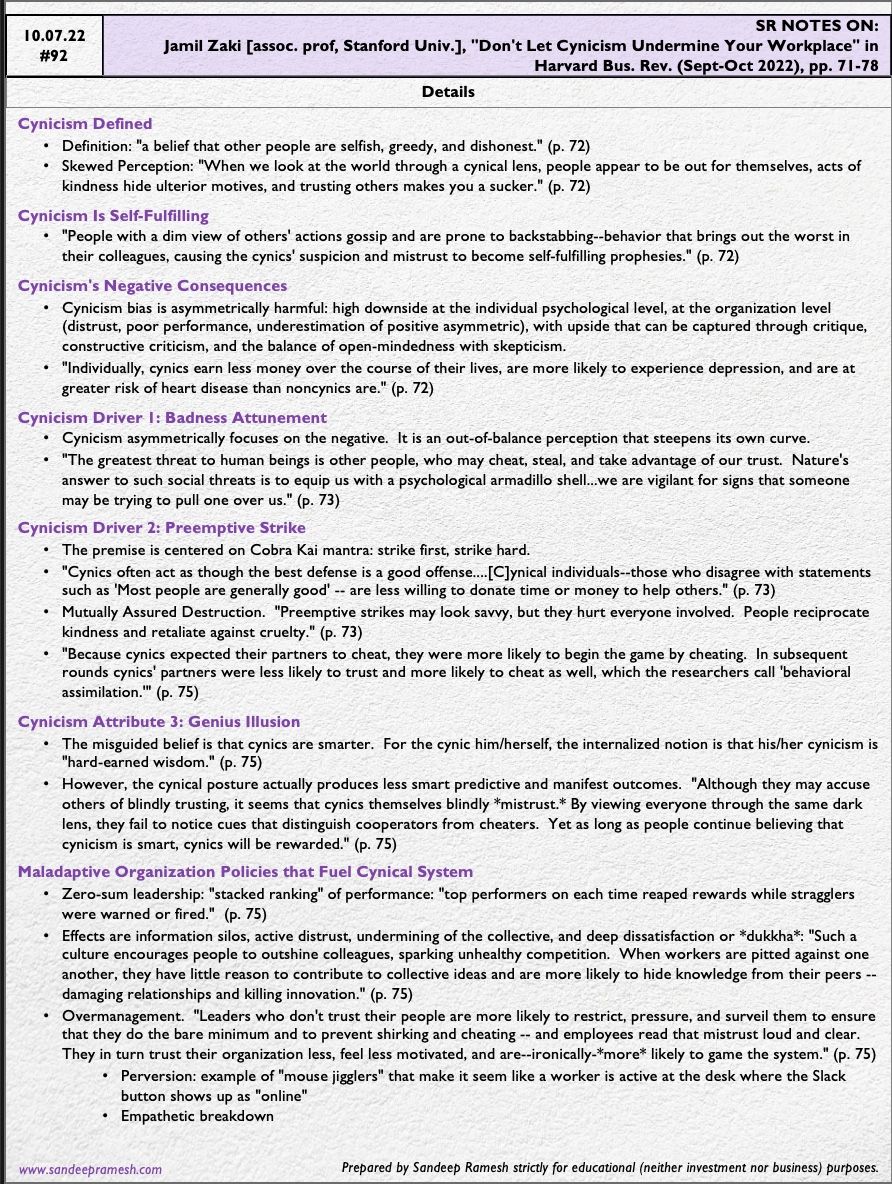Source: Jamil Zaki [assoc. prof, Stanford Univ.], "Don't Let Cynicism Undermine Your Workplace" in Harvard Bus. Rev. (Sept-Oct, 2022), pp. 71-78
The Context.
At the airport, after browsing the current issue of Guitar Magazine, featuring a cross-generational celebration in progressive guitar via Steve Vai & Polyphia, I happened upon the latest HBR.
And in it, an article on cynicism.
The Main Ideas.
An investigation into cynicism at the personal and professional levels--especially at at rarified high status jobs where analytical horsepower tends to be particularly selected--helped me reflect upon a phenomenon I've encountered directly in parts of my career journey: the "organizational dukkha" (to appropriate a term well-known in Buddhist circles to connote an underlying dull suffering).
Cynicism is a bias toward "a belief that other people are selfish, greedy, and dishonest" (p. 72), and Prof. Zaki highlights three drivers for its persistence.
1️⃣ Driver 1. An Asymmetric Focus on the Negative.
This creates a self-fulfilling prophecy of distrust and builds a "psychological armadillo shell" that causes one to presume that the light at the end of the tunnel is likely the light shining from an on-coming train. This was particularly felt in hyper-competitive arenas that are metricized and tracked.
2️⃣ Driver 2. The Cobra Kai Attitude.
The elevation of "win / loss," binary thinking, linear performance rankings, and zero-sum logic stoke hyper-competition, which in turn builds a "win at all costs" caricature. Strike first, strike hard. No mercy. This is, in fact, not a Spartan ethic but a perversion of optimal social behavior.
In the organizational investing setting, I have personally seen the undermining effects of this attitude that can lead (eventually) to self- and fund-destruction, expressed as a tendency to force exposure into the portfolio, protect fees over integrity, over size bets, and blatantly disrespect the risk of ruin.
I have also seen glimmers of the opposite. And, seeing more (whereas a more cynical self might singularly see the on-coming train).
3️⃣ Driver 3. Genius Illusion.
The misguided belief is that cynics are smarter. For the cynic him/herself, the internalized notion is that his/her cynicism is "hard-earned wisdom." (p. 75) However, constructive criticism and critique != cynicism. Cynicism might be seen as miscalibrated critique in need of a corrective, which begins with awareness.
With this motif of cynicism, one issue I'm circling is to what extent the specific version of the crypto movement fueled by a popular narrative of distrust has the seeds for its own undoing. As a corollary, I wonder to what extent the hyper-competition structurally underpinned by arbitrary supply/demand tokenomics leading to gamed insider moves and well-known VC concentration (for example) is a symptom of a decentralization mantra coopted by cynicism.
For further contemplation...
The Details.
